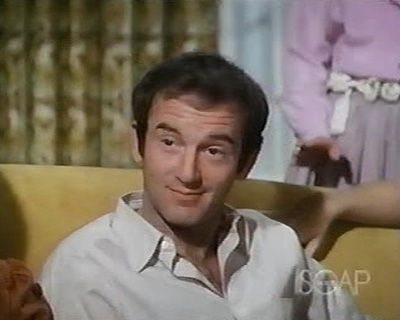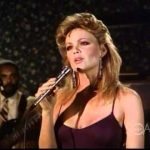John Pleshette strolls down memory lane with us.
Veteran character actor John Pleshette has played unpleasant characters his entire life. From President John Kennedy’s murderer in The Trial of Lee Harvey Oswald (1977) to slimy movie boss Gary Blondo in Murder One (1995-97) to Larry David’s weirdo therapist in Curb Your Enthusiasm (2001), Pleshette has crawled into the creepy and annoying and found fascinating human beings there. On Knots Landing, Pleshette not only played unscrupulous lawyer Richard Avery from 1979-83, he built him from the ground up, inspiring stories and laying the bricks for one of the most successful series in television history. Pleshette sounds the way he did in those classic days and almost looks the same, too. With his wry sense of humor in full force, he speaks to us from his home in Los Angeles.
AS: It’s terrific to be talking to you. Thanks for sending your picture and bio.
John Pleshette (proudly): You can add The Sopranos to that bio, too. I just shot an episode.
AS: The Sopranos! That’s my favorite show!
JP: Mine too. It’s going to be the fourth or fifth episode of the season but unfortunately it won’t be on until January I think. They really don’t want you to say too much about it. They tell you at the table reading, “Now please don’t tell your friends about this. It’ll be found out eventually but please keep the secret of what character you’re playing.”
AS: Fair enough. I won’t pry then. Congratulations and welcome to Knots Landing Net. I’d like to make the theme of this interview anecdotes. Any stories, recollections, funny things that happened, please, jump in at any time and tell us.
JP: I wonder how much you know then about how Knots got started.
AS: Probably not as much as you.
JP: My wife is a woman named Lynn Pleshette. She runs a small literary agency but it’s done very well. She’s sold The Truman Show and Memories of a Geisha, Cold Mountain, Shipping News. Well her ex-husband is David Jacobs. So in 1975 Lynn and I moved out here (L.A.) and David was in New York writing architecture book reviews for the New York Times and young adult things. When we came out he decided he missed his daughter Albyn and came out too. David wrote a story for the show Blue Knight, it was a cop show and then wrote some episodes of Family. Lynn became his agent and got him the job writing the pilot for Dallas.
AS: So his ex-wife became his agent? You and Lynn were married at the time.
JP: Yes she began representing David. Now most people don’t realize how Dallas originated. It came from Blood and Money, the Tommy Thompson book. It was a murder book, a very lurid book, a big Texas kind of thing. A huge, huge success and the network was looking for a big Texas story with these elements. So that’s where David’s story became very appealing to them
AS: Why not turn Blood and Money into a show?
JP: Because I think somebody else owned the rights to that but the idea of a Texas story was so hot that they needed something. David wrote Dallas and then they were looking for something afterward. David had actually written Knots Landing before Dallas but Dallas was important to them originally. (After Dallas was on) the network then said, “Whatever happened to Knots Landing, that suburban thing?”
Now I had been in a lot of movies at that time; I just had done Trial of Lee Harvey Oswald, which was an intriguing movie, based on the premise if Oswald hadn’t been killed by Ruby – what would have happened? David Greene directed it; he did Roots and Rich Man, Poor Man and many others. I played Oswald. So when David approached me to do Knots I was doing pretty well and wasn’t interested in episodic television. Lynn always said that her ex-husband turned me into a schmuck. (Laughs)
But this part was a lot of fun. The first year or so he wanted it to be like Family – issue oriented, self-contained episodes. (Knots) was loosely based on the movie No Down Payment with Joanne Woodward and Tony Randall. A 50s movie about married couples in Southern California.
I started writing at the end of the first season. The episode when Ted Shackelford’s character had a drunken experience, it was a two-part episode (“Bottom of the Bottle”). After that I had carte blanche to do what I wanted and wound up writing nine episodes.
AS: Why did they give you carte blanche?
JP: They liked what I was writing and wanted me to do more. See, the problem with the show was how do we get these people to interact with each other? The brilliant thing with Dallas was that all these rich and powerful people were able to interact with each other by living together. It was absurd but no one questioned that they all lived in the same house. They should have had properties all over the world!
I said, unless you get them into business with each other, how do you keep them talking to each other after a while? In a regular neighborhood a dog might misbehave or someone’s kid might break a window but other than that, nobody cares! That’s how I got the idea of putting them in the car dealership.
AS: You were taking a very active role in the writing and even story creation early on then.
JP: Yes, you can say that. So when did Don Murray leave?
AS: After the second season.
JP: Right. He wanted to leave. He sort of lost interest in it; I think he thought the show was going to be more about him. But there was all this discussion about how he could leave the show. I said, let’s kill him. And people said, oh you can’t do that. It just isn’t done. And I said, yes. If we really kill him, every time one of these characters is jeopardized the audience will feel like that character is going to be killed.
So I wrote two season openers, I think I wrote the one when he died, and later in the season I wrote “Night.” It’s every actor’s dream to write his own nervous breakdown, you know. I wanted to direct but they wouldn’t let the actors direct in those days. That was why I left the show.
AS: But then actors were allowed to direct later on. What precipitated the change?
JP: It coincided with David and Michael leaving the show. David was in charge of writers and Michael approved directors, the look of the show, wardrobes, sets. I know they spill over into each other, but Michael felt strongly about actors not directing each other. But when Lynn (Latham) and Bernie (Lechowick) became writers David and Michael began easing out. A season after the Lechowicks came David became less and less involved and eventually they took over.
AS: What did you think of the Lechowicks?
JP: I can’t stand them. I think they’re awful people. They were about to move back to Texas because they had been struggling so long. They were in contact with Lynn (Pleshette) and asked her is there anything you can find for us? Lynn met with them and she talked to David and they went from having no career to running the show.
Lynn was their agent and she got a big deal for them, but one day they said, “We need a bigger deal” and got someone else (to represent them). I had been writing for the show and they gave me a hard time every time I worked on it. That’s what happens when you have a husband and wife team or two people together, it becomes difficult. They were also kind of disliked by the people on the show; the writers they hired liked them but not many else.
AS: What did you think of their creative style?
JP: I think when the show started it tried to be about something. Don Murray had been accused of rape, Constance was actually raped, there were a lot of issues. By the time the Lechowicks took over it really had become a soap opera. Rich people in soap operas don’t deal with issues; the problems of real people aren’t sensationalistic and lurid. I think the Lechowicks had a certain playfulness but the show got more tawdry as it went on.
AS: You worked with them in my favorite Knots episode, “Birds Do It, Bees Do It.”
JP: Yes and that was the last one I ever did. Bernie told me with great glee that he had written it in two days. That’s not what you want to hear as a writer. (Laughs) For (Birds Do It) every one of the ideas I had to make it funnier was shot down. The only thing I got through was when we had Karen wearing a trenchcoat over sexy lingerie and in one scene I found a young woman who looked like Michele with the same height. So we had her walk past Michele in the hallway, both wearing trenchcoats. That was something I was able to slip through.
Then in that show we had Michael, he went camping and he’s going to make it with this girl. The Lechowicks, they were totally PC people, they had to show that if he was going to have sex that he took out the contraceptives and was being responsible. So I showed Michael with a pack of like five rubbers. I wanted to show him take four out and put one back but they wouldn’t allow it.
But there was a funny story with Michael in those scenes. Remember the part when all the kids he was with fantasized over their favorite stars? They were talking about Julia Roberts and the girls said Mel Gibson was whom they wanted to be with. Well it turned out that Mel Gibson was shooting on a neighboring stage. I was able to get in touch with him and asked him as a joke if he would come over and surprise the actors when we were shooting that scene. So we got Mel Gibson to come over to the set. We put him into a backpack and hiking gear so he would fit in with the scene. And the girls were totally unaware of this even though word had gotten out and we had 3 times as many crewmembers hanging around the shoot. When the time came there was a knock on the door and they just died when he walked on the set. They loved it; he even got a girl to sit on his lap. We shot all that. It was great.
AS: Why didn’t it make it on the air?
JP: Well legally we couldn’t do that. We would have had to pay him and it would have been a big deal. I think it might be on an actor’s reel somewhere. But that was my swan song.
AS: Why did it end that way?
JP: They were furious that I criticized the script. They were infuriated by attempts to make it funnier. I think that show could have been funnier.
“I said, let’s kill him. And people said, oh you can’t do that. It just isn’t done.”
AS: Let’s get to some questions from our Knots Landing forum members.
Christine from Germany asks
Were you satisfied with the way your character was written out or would you have preferred a different exit for Richard. After all we never knew what happened to him until he showed up again for Laura’s funeral and that was 5 years later!
JP: I thought the ending was fine. He either leaves or he dies; there wasn’t another way to do it. This left him open to returning.
AS: And was it just because you wanted to direct?
JP: I had had it. I wanted to do other things and directing was one of them. I really liked this cast. No tempers, no stress. I had a great time with Michele, with Donna. It was a nice community and I had a certain amount of control over the material. But there was only so much you could do with Richard Avery. The show became much more glamorous and I’m not glamorous. Richard was a jerk. If you’re not playing a villain, you might as well play a jerk.
Shari from Clermont, Florida asks
John, thank you for answering our questions! What was the best part of working with Constance McCashin? You both played off of each other very well. I really enjoyed Richard on the show, and in later episodes sure missed your famous BBQ’s!! Take care, and thanks!!
JP: We just had a very nice working relationship. It took a few years to develop though. Her husband is a very successful film director, Sam Weisman, but at the time he was an actor. And I think Constance wanted him to get the part that I played. So the first season Constance was kind of prickly. When I made a suggestion, she sort of bridled. After that though it was great. On a show like this you have a creative energy that builds and it was obvious with us I think. Back then they were against actors directing each other.
AS: When you were a director were the casting decision yours? For the smaller parts I mean?
JP: Most deferred to me in the casting. I was able to get a lot of my friends in. Not that they weren’t good actors (Laughs), but they were still my friends. In fact I was able to get Zane Lasky in there and who was the other guy?
AS: Mark Haining.
JP: Right, Zane Lasky and Mark Haining. Zane was in a play I was doing and Mark I believe came from an acting class, and they wound up there for a while. They became a running joke, those two characters, which was great. And people probably don’t realize that Bill Devane and I are actually very good friends. We wrote scripts together and Billy, Eugenie (Mrs. Devane), Lynn and I went out together many, many times. He’s a very funny guy and it’s funny that we wound up having the same wife on the show.
KissTheCook from West Hollywood, CA asks
Hello John, first off let me say that your portrayal of Richard Avery was just amazing and I would like to take the time to thank you for your hard work. I would like to know which storyline involving Richard was the most challenging for you as an actor and what were some of the things you drew on for inspiration?
JP: Most challenging was the “Night” episode. I thought that since I wrote that script that it would be easier to act but it turned out to be harder for some reason. Maybe it’s the process of being a writer that makes it more difficult acting it. I did a lot of research, though. I contacted a police psychologist and tried to draw the story from what they do, what their approach is to real life hostage situations. Once someone like that (a hostage taker) reaches the point of despair how do they go on?
Something else that I drew on for acting as Richard was cooking. Personally I’m a very good cook and I do all of the cooking at home. So the idea of a restaurant was mine and I thought it would be good to show that aspect of me. And you know, the name of the restaurant, “Daniel”, was from Constance’s child who she had on the show.
AS: This is along the same lines, but lkc1 from Manchester UK asks
What was your favourite Knots storyline and which storyline did you really dislike/would have liked to change?
JP: Different episodes draw upon different aspects of you as an actor. Certainly the stuff with Donna was fun. That was a funny story too. We had this hot tub scene to do and I had to take the straps off her bathing suit. We had to get around Standards and Practices on that one. Well the day we were shooting the hot tub wasn’t filled with hot water, so when we got there the water was freezing. The guy who was supposed to fill it was a type who started drinking at 6 am and was fired after that. (Laughs) Anyway, they kept trying to throw hot water in there but it really wasn’t working. So I started drinking champagne and after three glasses I didn’t care about the temperature at all. But Donna was still freezing and every time I touched her she shivered. When the network watched it they thought she was having an orgasm. Every time I touched her, a new orgasm. They said, “This is the hottest scene we have ever seen.”
I don’t think of storylines, but the people you worked with. Trying to think of an anecdote here … there was a show when we had a biker gang, down in Torrance, bikes on the beach, fairly silly episode. Don Murray and Ted Shackelford show up on the beach and try to rescue the women. Ted said, “I can run down the hill on my own, I don’t need a stunt double.” Well sure enough, he tripped as he was running down the hill and got scraped up. And when we did “Bottom of the Bottle,” Ted slipped in a fight scene and actually broke his arm. It wasn’t scripted but his arm was in a cast in scenes that came later that episode.
AS: And I guess it healed over the summer since it was the finale.
JP: That’s right.
“If you’re not playing a villain, you might as well play a jerk.”
Chris from Winston-Salem, NC asks
Hi John… I thought you did a great job with Richard Avery… so when I say… I didn’t like him; I am not talking about John Pleshette. With that said, did you LIKE Richard Avery? In other words, was he really a jerk or just a good guy in a bad situation?
JP: I think both those things are true. You can’t play somebody you don’t like. Tyrone Guthrie, the famous director, once said to Olivier, “If you don’t like a character, how can you play him?”
Bob Philips from the UK asks
Hi there John, how did you feel when you were invited back to appear in the 2 Improvisation episodes after the Laura character had been “killed off”. Also was it fun being part of the improvisation or just plain hard work?
JP: I thought it was a lot of fun. It was at David’s house near where I live with Lynn, near the Hollywood sign. We had a catered party for 2 days. I wonder if anything was actually scripted from those days, or anything was written. We basically interacted in character and 98% of this would put you to sleep. But they had nice food and we chatted and made up stuff about our pasts.
AS: Did they use any of this in the episodes then?
JP: I don’t know. They certainly had to invent more than what they had from the improvisation.
AS: Did you wind up liking the finished product?
JP: There wasn’t enough drama I think to fill two hours of TV. It could have been one and probably better. You know, when you’re on a show like this and a main character dies, I think your feelings as actors are disproportionate to its real drama. I think the people working on the show made a bigger deal of (Laura’s death) than people watching did.
AS: Actually, the death of Laura is from my estimates the number one event in the history of the show for our forum members. It’s like people think their mother or aunt died.
JP: Really? That’s interesting. I guess because that was the last realistic tragedy on the show. From there the show got more sensationalistic and less realistic. I mean, wasn’t there someone buried in the cement? Knots got further and further from the audience’s day-to-day experiences. Laura’s death from cancer was something that people could identify with; they lived with that kind of thing everyday.
AS: And Constance was unique for the show, very down to earth.
JP: I think that Constance and Julie Harris were the two best actors on the show. But that’s where the problem lies. Where does Lilimae fit into big corporate buyouts? That’s the kind of thing Donna fit into. Donna was the first real glamour girl and she was followed by Nicollette and a lot of glitzier types. That’s where the show drifted.
AS: But why did this happen if people on the show didn’t want this? Was this pressure coming from the networks to make the show more glamorous? Was it ratings-driven? No one ever seems to know why decisions like these were made.
JP: Well as a show goes along the show runners have more power and the network has less but the network does determine the direction of the show to an extent. Look, the show needed to be bigger for it to sustain. It probably wouldn’t have lasted very long if it stayed exactly as it was in the beginning. The interesting thing about The Sopranos is that these characters never lost their humanity. With Knots, it became more about the shenanigans, Enron-like corporate connections and personal business connections.
Really good shows never lose their humanity. The West Wing has never lost it, even on the grand scale that it is.
Chris Sumner from San Antonio, Texas asks
I was wondering how it was being on Curb Your Enthusiasm? That was the only episode of that show I watched, only because you were in it, and I thought it was the funniest thing I’d ever seen! You deserved a Guest Starring Emmy or Golden Globe for that!
JP: (Laughs) Thank you. That was a lot of fun. That’s a different kind of improvisation that Larry David does. It’s done very tightly and he has high points he wants you to hit in the scenes. But the lines are still ones you come up with.
AS: “The thong.” A comedy classic.
JP: Yes, the thong.
AS: I can see you doing very well as a regular on an HBO series. You’ve done The Sopranos and Curb; it would seem to fit your style perfectly.
JP: Yeah I’d love to but the older you get there are not as many parts. It seems like every actor working now is between the ages of 20 and 40. I don’t work as much as I used to. I do mostly screenwriting now.
“Where does Lilimae fit into big corporate buyouts?”
Lotus Pointe from Philadelphia, PA asks
Hi John! I recently visited the cul-de-sac in person, and it struck me how out of the way it is. How did shooting take place there – did you shoot all the outside scenes say in 1 or 2 weeks, then just do on-set filming, or did you go back and forth from set to the cul-de-sac? Thank you for your time! Love you
JP: Lotus Point? That’s someone’s name?
AS: No it’s a screen name. All of these names are Internet names, not real.
JP: Oh I see. We went back and forth to the cul de sac. It’s not far if you live in L.A., though I can see someone outside the city thinking it is. Here we’re used to driving long distances to go to work. But for me I’d hop on the 405 (freeway) and was at the cul de sac in 15-20 minutes. Usually they bunch up the exteriors in a few days. The interiors would be done in the beginning of the week and the exteriors later in the week. I think there was only one house that wasn’t occupied on the cul de sac so everything was mainly done outdoors.
The furthest location we went to was Bill Devane’s ranch in Thousand Oaks. That’s really far; I think it’s over the Ventura County line even.
AS: How long was a typical episode shot in?
JP: I think they were done in 7 days. By the end they were done in 6 ½ days. The Lechowicks wrote short scenes – one page, two page scenes at most, not the four page scenes of the past. So that involved moving to a different set every time a new scene was shot. It made for a very difficult schedule as time went on.
James from London asks
When Knots first began, I was expecting it to be more of a Dallas type show, with Richard and Laura as the JR and Sue Ellen of the cul-de-sac. Initially, I was disappointed that their relationship took so long to unfold, although this approach ultimately proved far richer and more rewarding. What expectations did you have for your character when the show began, and what was your opinion when Knots adopted a more serialised format in Season 4?
JP: I didn’t have expectations for Richard. As an actor you’re hired to a do a part and you really don’t think of where the character is going to go. As for the serialized format, after the audience is used to watching certain character over time it makes sense to have more continuing stories. So I thought that was fine. I think what was great about Knots for a time in this format is that it didn’t become a soap opera like Dallas or Falcon Crest.
Pam’s Twin Sister from Barcelona, Spain asks
Can you tell us anything about late Katharine Hepburn, with whom you worked in the TV movie Mrs. Delafield Wants to Marry? Thanks a lot.
JP: She was great. Such a pleasure to work with her. Terribly hard worker. We had four days to rehearse before we began shooting and I got to really see her during that time. One of the most amazing things about her was, she was really suffering from Parkinson’s but she made it work. She had a way of hiding her pain and becoming the character when it was obvious to everyone how much pain she was in.
Tatianna from Virginia asks
Everyone’s life in Knots Landing twined together, so to speak. If Richard had stayed in Knots Landing, do you think Richard would have eventually gotten involved in dealings with Greg? Also, could you have possibly had a “love interest” in Paige, Jill or Anne?
JP (jokingly): Well I definitely would have liked being with Nicollette. But if you wanted to do something with Richard, make him a powerful character. Make him a Richard III, like an unlikely villain. No one would have suspected Richard to have any power so it would have been interesting to have him pit one against the other and acquire power that way. On shows like NYPD Blue, Bochco has developed a real journey for Sipowicz. With Gandolfini on The Sopranos you have a guy who routinely murders people but is devoted to his family. The idea of a wiseguy going into therapy is brilliant because he really changes over time. On Knots the problem was that everyone was doomed to play the same notes in songs. They didn’t grow.
AS: I would disagree with that. Devane’s Greg Sumner was one character on Knots who definitely kept growing and evolving over his ten years on the show. He was hit with so much but kept the humanity and the interest level high.
JP: Yes, Billy’s a very forceful person and knowing Billy I’m sure his character developed because of the forcefulness he brought to the set. I can see him shaping his character into a way that he wanted. He was great in that role, and really eased into it over time.
AS: Last thing, just for laughs, were Ciji and Laura supposed to be having a lesbian relationship?
JP: Yeah there was certainly an implied lesbian possibility between the two of them. One time I walked into do a scene with them and they played a joke on me by turning around and looking at me with mustaches on. So yeah, it was talked about. I’d say it was implicit and not explicit. I don’t think Laura and Ciji were actually having sex but it could have led to something else.
AS: It’s been a pleasure, Mr. Pleshette. Please don’t be a stranger to Knots Landing Net.
JP: Thanks very much. I really enjoyed myself.







